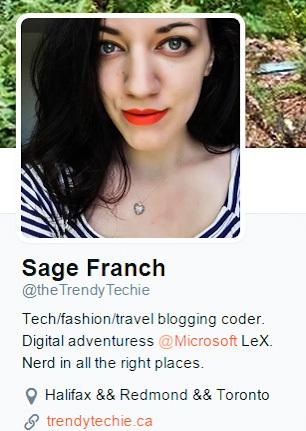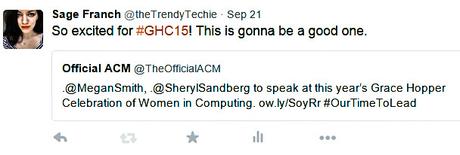In an hall of 10,000 people, how do you get noticed? Networking is a skill that is fundamental to the success of your career, and it can be a difficult one to master, particularly for large-scale conferences and events with thousands of attendees. Luckily, the dawn of social media has brought us powerful tools that enable us to broaden our networks and reach far more people than ever before, all with small, 140-character bites. As a frequent conference-goer and international networker, I have learned to rely on Twitter for my large-scale networking and have seen great results (100+ new followers in a day? Yes, please!). Here are my tips on how to leverage Twitter as a networking tool and make a big impact at your next big event.
Have a strong bio
How do you sum yourself up in 140 characters? A good bio is difficult to craft, but it’s so important because it’s your first impression when someone looks at your profile. Consider it the Twitter version of your elevator pitch. Your bio should say what you do and where you do it, and it should give the reader a feel for your personality. To maximize the impact of your words, cut out unnecessary filler like, “I am a,” “I really enjoy doing,” and other explanatory phrase components. Your bio is a statement, not a conversation. Take a look at mine, for example, @theTrendyTechie.

Start tweetworking before the conference
About three weeks to a month before a major conference is when I usually start to tweet about it. Find out the conference hashtag and tweet about what you’re looking forward to. The beautiful thing about social media is it provides us with a way to e-meet people from all around the world, which means we can start meeting fellow conference-goers well in advance of the event. In some cases you may find that you really click with someone (pardon the pun), and can arrange to meet up for coffee, lunch or dinner while you’re both in the conference city. This is particularly great because you can identify people you want to meet ahead of time and really make the most of your conference hours meeting with people instead of finding people to meet with.
#Hashtags
Hashtags make your tweets searchable and more visible to other people. Use the conference hashtag, and use it well. Use other hashtags sparingly – you don’t need to pull in the whole world to your conversation, (and hate to break it to you, no one cares about your #squadgoals), you just want to network with people at the conference. Most conferences will announce their official hashtag, either on their website or on their Twitter account. Don’t simply guess it, because if you tweet to the wrong hashtag, people won’t see it and all your hard tweetworking goes to waste.

Don’t be shy, tweet at people
Did you like a person’s talk? Tweet at them, “What a great and inspiring talk by <@person>, I loved what you said about <something they mentioned>.” Or if you remember a quote from their talk, quote them and add their handle and the hashtag. Did you spot someone but not get a chance to say hello? Tweet at them with a simple, “Thrilled to have seen <@person> at #EventHashtag today! Hope we get a chance to chat while we’re here!” Simple notes like these are a great way to show your appreciation and get one-on-one interaction with people who are too busy to meet and chat. Always tag people you are tweeting about or to, because that’s how you make sure they get a notification about your tweet. Often, people will retweet your tweets to their audiences, giving you more tweetworking reach, or if you’re lucky they might even invite you to speak to them privately! Pro tip: never be too shy to tweet at somebody, you never know what it could mean to them and what it could do for you both.
Exchange Twitter handles in real life conversations
It may seem awkward to ask someone what their handle is, but it’s really a way of saying, “I find you interesting and appreciate what you have to say.” In traditional networking styles, following up with someone via email or phone after a conversation can be difficult and awkward. If you don’t have that much to discuss and just want to maintain a relationship, Twitter is a great way to follow up with a simple 140-character message. So it’s perfectly acceptable to exchange handles with someone, and even put your handle on your business card.

Remember, tweeting is a two-way street
It’s not just enough to tweet your own tweets and expect other people to interact with them. To really get conversations flowing, keep an eye on what other people are saying about the events, and interact with their tweets, too! Favourites, follows, retweets and replies show that you care about what that person is saying, and it’s likely that they’ll check out your profile to see if your tweets are interesting. To see what other people are saying about the event, click on or search for the conference hashtag, and you can see all the tweets that use that tag.
Twitter is a powerful tool for expanding your network and staying in touch with your professional network in a more casual, interactive way. If you put some effort into tweetworking, you will see great results. Let’s kick off your tweetworking mastery together: tweet at me, @theTrendyTechie, and let me know what you think of this post, my blog, #GHC15 – or anything really, let’s just chat! See you in the twittersphere!







COMMENTS ( 1 )
posted on 13 October at 20:47
Why people still make use of to read news papers when in this technological world all is available on web?